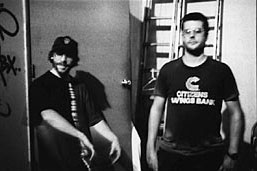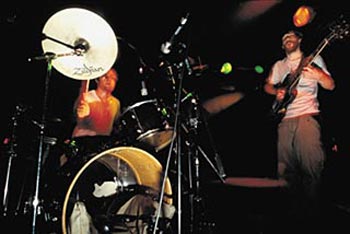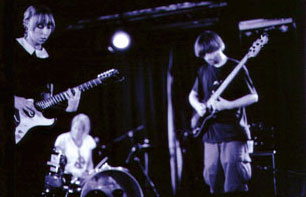| ORTHRELM
by Weasel
Walter

Mick Barr
is the most focused and uncompromising composer in the current
rock underground. He is a remarkably fleet guitarist as well
as a modest, understated personality devoted to an almost
hermetic musical discipline. His main project Orthrelm has
recorded for numerous labels including Troubleman Unlimited
and Three One G. The instrumental duo's output is densely
packed with musical information: with little or no structural
repetition, discreet cells of notes are often frantically
reconfigured into every possible permutation with staggering
speed, revealing a fractal-like inner logic that is both chaotically
asymmetrical and perfectly ordered at once. Barr and percussionist
Josh Blair perform these compositions -- often containing
mindbogglingly lengthy and complex unison passages -- with
a stunning level of clarity and precision. Although the somewhat
monochromatic instrumentation (imagine an aural apex somewhere
between the Bartok String Quartets played on 45 and the second
Deicide album, minus vocals) tends to immediately obscure
some of the more subtle variations in approach of the individual
compositions, the resulting intensity is tangibly visceral
and exhilarating. This stuff isn't sonically polite, effete
"new music" for chin-scratchers, but rather a modern
chamber music straight from the streets, complete with brass
knuckles. It hits hard and fast, but with formidable brain
power, guts and instinct. The incredible rate of information
and detail contained within Orthrelm's music insures that
it will last long into the future. It's not that the group
is ahead of it's time, but that most listeners are merely
behind the times. Eventually everybody will catch up.
In addition, Barr also maintains a solo project called Octis
as well has having recently played bass guitar with the group
Quix-o-tic (featuring ex-Slant 6 singer/guitarist Christina
Billotte.) The following is an email interview from February
2004, while Orthrelm was on tour with The Locust and The Dillinger
Escape Plan.
==========================================
Weasel Walter: One of the first things that was obvious to
me about your compositions is that they easily transcend the
simple categorization of just being "rock music".
I get the idea that your writing for Orthrelm and Octis has
more to do with abstract concepts than trying to be a certain
type of music. Is this true?
Mick Barr: the non-repetition is definitely deliberate, but
everything else wasn't really conceptualized so thoroughly.
so, yeah, it wasn't trying to be a certain form of music.
josh once said that our m.o. was that he didn't play backbeats
and i didn't play chords, so that definitely gets us away
from "rock music".
WW: I think that the guitar/drums format is just incidental
for you - it's just a format to get your ideas across with.
Is this true? If you could have any possible instrumentation
to work with, what would it be?
MB: i definitely like the guitar/drums format. it may have
been incidental at one point, and it may be incidental now,
but for a while there it was exactly what i wanted to work
with. i've thought of orchestral type instrumentation, but
that seems like a lot more work than i'm cut out for. as i
can't really read or write notated music. now i like the idea
of guitar, 2 drummers, and oboe. maybe some kind of bass drone
as well. i can't be sure until i try things, but i never try
things.

"when me and josh are in the same town,
we usually practice 6 days a week for about 2 hours a day.
then I'll practice another 2 or 3 hours in addition."
WW: Can
you tell me about any non-musical continuity or storyline
behind the music of Orthrelm or Octis? You seem to have developed
your own language for these bands and the visual art often
reflects the structural density of the music . . .
MB: well, there's definitely some sort of continuity. most
of it kind of surfaces subconsciously. i don't really know
about the storyline, but things i tend to think of follow
the cycle of the infinitely small and the infinitely large.
and also, i sometimes think that the chaoticness kind of reflects
the chaoticness of the universe. like the quantum jumps of
molecules and things like that. insectoid speed. these weren't
in any way thought out before hand, only recognized after.
it kind of stems from both science fiction and reality. i
can't really put it into words so well, so, that's where the
made up language comes in.
WW: Does that sour little harmony you play before the Octis
songs signify anything in particular?
MB: it's kind of like when a barbershop quartet hums a harmony
before starting to sing. just to get into the moment. it wasn't
really intentional on the double cd, just something i did
subconsciously before playing the song. when i listened to
it back i liked it as a drone to kind of link everything together.
like every song is all part of one idea, because that's sort
of how it is. so i decided to put it before every song on
the 2 seven inches.
WW: I've
heard more than a few extremely misguided people remark that
they thought you were just making up the Orthrelm songs as
you went along. This clearly is not the case. What is your
reaction to something like this?
MB: well, i can understand it to an extent. that's been an
interesting sort of by-product of all this. it seems like
people who say that either aren't playing close attention,
or don't really understand improvising. i don't mean that
to sound snobbish, as i don't really think i understand it
either, nor would i be bothered to pay attention to this if
it wasn't us. once, when asked about that, josh replied, "what
do you think we are, the best improvisors ever?" i don't
ever take any offense to it at all.
WW: How important is intensity and impact to your music? How
important is intelligence? Do you think the two are at odds
with each other in rock music?
MB: i'm not sure about this one. i think intensity and impact
are both very important, but i don't think that i've ever
consciously thought about it using those words. i like the
way it feels to play everything as fast as we can, and to
play as much as we can. it's easier for me to do. the less
going on in the music, the less comfortable i feel. like when
i play bass with quix-o-tic, i get so nervous just holding
notes and waiting to hit another note. there's way too much
time to think while the same song is going on. when you just
play so much all at once it's easier to blank out and let
your fingers do what they're supposed to do. i don't think
intelligence is as important. most of what happens in it to
me isn't really thought out too deeply. it's mostly about
building parts upon parts in relation to how it sounds. i
don't really know if the intelligence and impact are at odds
in rock music. probably in most.

"like when i play bass with quix-o-tic,
i get so nervous just holding notes and waiting to hit another
note."
WW: What
is the role of discipline in what you do?
MB: discipline is probably the most important ingredient.
it takes a lot of time to write these things, and a lot of
practice to not forget them. and once they're there, and i
can play them, it has to be played regularly until it is time
for them to be forgotten, usually after they are recorded.
when me and josh are in the same town, we usually practice
6 days a week for about 2 hours a day. then I'll practice
another 2 or 3 hours in addition. besides, it takes a lot
of discipline to make myself write these things. sometimes
it's not fun at all, but that's not the point to me.
WW: Name three of your favorite records that you think no
one would expect you to like . . .
MB: people always seem really surprised when i tell them that
i really like the last 3 dark throne albums. "ravishing
grimness", "plagueweilder", and "hate
them". i really like how they just make the same record
over and over again. it's definitely inspired me to not feel
pressured to keep changing just for change's sake. i like
repeating myself, just saying the same thing a little differently
each time.
WW: Please describe the process of writing and learning the
average Orthrelm composition.
MB: there's a couple different ways we write. sometimes we
collaborate. i'll write a part, and josh will write the next
part, and we'll stick them together, alternating parts until
the song feels finished. some things josh just records some
drum parts and i write things to follow it. the first record
and the 31g record were mostly things i wrote before we started
playing. i always keep a hand held tape recorder in my guitar
case, and every time i write a part i like i'll record it.
then over time i'll expand on it, adding other new parts.
MICK
BARR DISCOGRAPHY
with CROM-TECH
Crom Tech Xmas Tape (1996)
Crom-Tech (1997, 7-inch)
Crom-Tech (1997, Gravity LP)
Crom-Tech (1998, Slowdime LP)
with ORTHRELM
Orthrelm I
(2001, Million Races CDR -- 20 copies)
Orthrelm II (2001, Million Races CDR -- 50 copies)
Iorxhscimtor (2001, Tolotta CD/LP)
Asristir Veildroixe (2002, Troubleman Unlimited LP/CD)
Touchdown/Orthrelm split (2002, Troubleman Unlimited LP/CD)
2nd 18/04 Norildivoth Crallos-Lomrixth (2002, 31G CD)
as OCTIS
uppragn srilimia ixioor ocrilm nolifithes mrithixyl
(2002, Peterbilt 2CD)
TMUSSS014 (2003, Troubleman Unlimited 7-inch)
with QUIX-O-TIC
Mortal Mirror (2002, Kill Rock Stars CD)

|